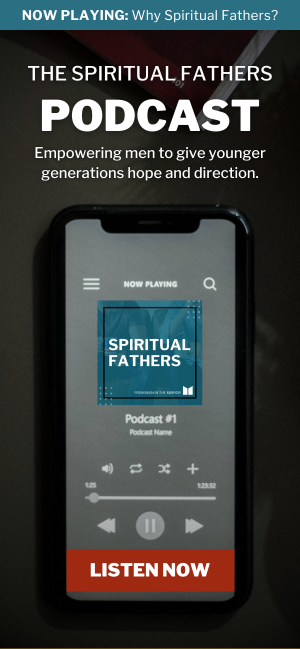“Wait and See” vs. “Go and Make”
Often, it seems we read the Great Commission as, “Wait for men to come and then see if hanging around the church helps them become disciples and teaches them to obey everything I have commanded you.” But Jesus said, “Go and make…”

By the Man in the Mirror Team
Jeff was an up-and-coming professional in town. Married with three young kids, he had grown up in a local church that he still attended almost every week with his family. His wife was involved in a women’s Bible Study, and he occasionally played basketball with some men from the church.
Then one day, he was working late with a new coworker and felt a spark of electricity. A few weeks later, he had moved in with her while he “figured things out.” After a month of wavering, he made the decision he wasn’t going back to his wife, his family, or the church.
In another church, Alex’s wife really wanted him to attend with her and had been praying about it for a long time. He argued with her for a while before finally telling her he would give it a try. The first Sunday they attended together, one or two men shook his hand, but it was pretty easy to slip in and out without too much drama. He went back the next week and then skipped a week to play golf.
Over the next several months, he went 2-3 times a month with his wife. A few men learned his name after a while and said hello when they saw him, but it never went deeper than that. Finally, one Sunday, Alex told his wife he had tried church but that it just wasn’t for him. He was done.
Unfortunately, these stories will be repeated hundreds of times across the country this week. What’s the common denominator?
Wait and See?
Often, it seems we read the Great Commission as if it said, “Wait for men to come and then see if hanging around the church helps them become disciples and teaches them to obey everything I have commanded you.”
But Jesus didn’t say to His disciples, “Wait and See.” He said “Go and make.” The Great Commission implies an intentional, proactive stance toward discipling men.
This means that first of all we have to be proactive in our own efforts at discipleship. Going to church or our small group will not make us a growing disciple any more than hanging out at a hospital will cure cancer. We must make the effort to pursue Christ by faith, to root out idols that are distracting us from Him, to connect with other men who can help us depend on Christ in all things, and to live an integrated life that brings glory to God through everything we do.
It takes intentionality and effort to consistently love Christ. In the same way, it takes intentionality and effort to consistently love others. If our churches are to effectively disciple men, there must be a core group of men who are willing to go after other men. We can’t just wait and see; we have to go and make.
How to Make Disciples: Content, Relationships, and Process
If a sincere seeker came to your church, can you name the likely steps he would take to become a mature disciple? What classes or groups might he get involved in? Where would he establish friendships or relationships? What service opportunities could he join? And in what order would this happen?
Most importantly, would he have to initiate each of those steps on his own, or does the church have a group of men who would shepherd him through a flexible, yet defined process?
In many churches, the typical approach is to throw a lot of activities out and see who sticks. We have a leader passionate about a particular issue and willing to do the work—go for it! So we end up with two or twenty things going on every week in which we just hope that somehow, someway, someone will actually get connected.
But when we just throw activities at people, unchurched and introverted men will almost never get involved. If you want to reach these men, you need a process to get them connected to effective activities through relationships.
Many churches think of discipleship primarily in terms of content. If you can distribute enough biblical knowledge, then you will have created a disciple who lives out his faith.
Other churches add an emphasis on relationships to this mix. They want people to do life together in such a way that faith-filled living is caught in addition to being taught.
Both of these approaches are incredibly important. You can’t be a growing disciple without content; you have to know the scriptures and the heart of God. You also can’t grow in isolation; you were created for relationships and to live out the Christian life in connection with others.
But we also have to add to these an effective overall process by which we are going to help people learn the content and develop authentic relationships.
If our churches are to effectively disciple men, there must be a core group of men who are willing to go after other men. We can’t just wait and see; we have to go and make.Click To TweetNo Man Left Behind
Does your church have a group of men committed to creating a custom process to accomplish this? There ought to be 3 to 12 men in your church whose primary focus is not just putting on a breakfast or retreat or service project, but rather how they can build a strategy for the men in your community that helps them become passionate disciples of Jesus Christ alongside others. This is what the No Man Left Behind Model is all about.
If you are ready to go and make disciples of men through the local church, then we believe the No Man Left Behind training is your right next step. We offer live trainings 2-3 times per year, as well as video-based training. We’d be honored to help your church create a process that leads to deep friendships among men and growth in faith and knowledge.
You don’t have to wait and see if men “stumble into” discipleship. You can follow Jesus’ mandate to go and make disciples. It’s our highest calling.
THE BIG IDEA: To go and make disciples in our churches, we need an effective overall process by which we are going to help people learn and apply the scriptures and develop authentic relationships.
This article was adapted from a previous Man in the Mirror article titled, The Importance of Being Intentional in Discipleship, from 2012.
♦♦♦








Thankyou, I am that man, and angry that I was treated like dirt. It was one of the worst times of my life and I’m still looking for a church home.
Love this! Spot on!